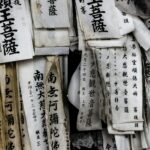
“Insects fall silent amid the sedge and cranes grow restive in the treetops,/Sensing this busy world no longer cares for the sentiments of old.”
The poet Li Zhong (李中, 920-974) is one of the more unique figures from the world of Chinese poetry. He is virtually unknown outside of China, and there is little information available about his life. As far as I know, his poetry has never previously been translated to English.
He appears to have been a minor functionary, involved in administration at a local level for a number of years, a job to which he seems to have been singularly ill-suited. He then abandoned anything resembling a normal life to become what he described as an “idly wandering poet.” He had strong Taoist leanings, actively seeking out Taoist masters (to whom he sometimes refers as “immortals”), visiting Buddhist monasteries, and playing chess with the monks. His Taoist sympathies are further evident from his disparaging remarks about the society of his day, as well as his love of the solitary life, themes which are present throughout his poems.
Li Zhong was active in poetry circles, counting a number of prominent authors among his friends. He frequently swapped his work with these friends. This is clear from many titles in which he simply refers to the person for whom that particular poem was intended. Although certain well-worn phrases recur repeatedly, his verses are seldom dull. They contain unexpected imagery and often are characterized by a quirky sense of humor. His whimsical style deserves to be better known.
As with many others from that period, his favorite poetic forms were lüshi, consisting of eight lines of five or seven characters each, and jueju, or “cut-off verses,” the shortest form of all, consisting of a quatrain of four lines. Below are examples of five lüshi and one jueju.
Presented to Minister Shen Bin on Resigning from Office
寄贈致仕沈彬郎中
鶴氅換朝服,逍遙雲水鄉。
有時乘一葉,載酒入三湘。
塵夢年來息,詩魔老亦狂。
蓴羹與鱸膾,秋興最宜長。
One morning I don my cape of feathers, and wander under clouds amid lakes and rivers.
Later I board a boat laden with wine, bound for Xiangjiang.
In recent years all worldly ambition gone, ever crazier my old love of verse.
Perch and watermelon soup, how appropriate to the mood of autumn.
Translator’s note: “Cape of feathers” refers to a type of ancient Taoist robe made from feathers. Xiangjiang is a large river basin in Hunan province.
Comments on a Visit to the Reclusive Scholar Cai Wenqing
訪蔡文慶處士留題
幽人棲息處,一到滌塵心。
蘚色花陰闊,棋聲竹徑深。
籬根眠野鹿,池面戲江禽。
多謝相留宿,開樽拂素琴。
A hermit in his place of seclusion, one who has washed away the dust of this world.
His moss-covered cottage hidden by flowers; deep among bamboo paths the sound of chess.
Deer sleeping at the foot of a fence, fowl playing on the surface of a pond.
Grateful he should ask me to stay that night, we open a bottle. He plucks his lute.
Cooked Game
腊中作
冬至雖雲遠,渾疑朔漠中。
勁風吹大野,密雪翳高空。
泉凍如頑石,人藏類蟄蟲。
豪家應不覺,獸炭滿爐紅。
Midwinter still some way off though you’d never know in the northern deserts.
The howl of strong winds, heavy snow concealing the sky above,
Springs frozen hard as rocks, people hibernating like insects,
The better off invisible, their blazing ovens bursting with roasted game.
On Hearing Zheng Yuren Plucking His Lute
聽鄭羽人彈琴
仙鄉景已清,仙子啟琴聲。
秋月空山寂,淳風一夜生。
莎間蟲罷響,松頂鶴初驚。
因感浮華世,誰憐太古情。
Strains of the lute heard faintly from the land of the immortals,
Harvest moon rising into the night sky above lonely mountains.
Insects fall silent amid the sedge and cranes grow restive in the treetops,
Sensing this busy world no longer cares for the sentiments of old.
Presented to Yang Zai of Qushan Temple
贈朐山楊宰
訟閑征賦畢,吏散捲簾時。
聽雨入秋竹,留僧覆舊棋。
得詩書落葉,煮茗汲寒池。
化俗功成後,煙霄會有期。
Idle dispute about a poem over, we draw back the curtains,
Listen to bamboos rustling in the autumn rain, and finish a game of chess.
With water from a pool and loose leaves from a poetry book we boil up tea.
Our contribution to culture complete, it is time for the mist and clouds to gather.
Feelings Turning to Thoughts
感事呈所知
競愛松筠翠,皆憐桃李芳。
如求濟世广,桑柘願商量。
Unbounded love for pine and green bamboo,
Ready sympathy for fragrant peach and plum.
But if seeking to benefit the world at large,
We need to talk about mulberries.
Tom Ehrman, who holds a Ph.D. from King’s College London, is a translator of classical Chinese, specializing in medical texts and poetry. He has a particular interest in poetry of the late Tang period. He lives in London.











